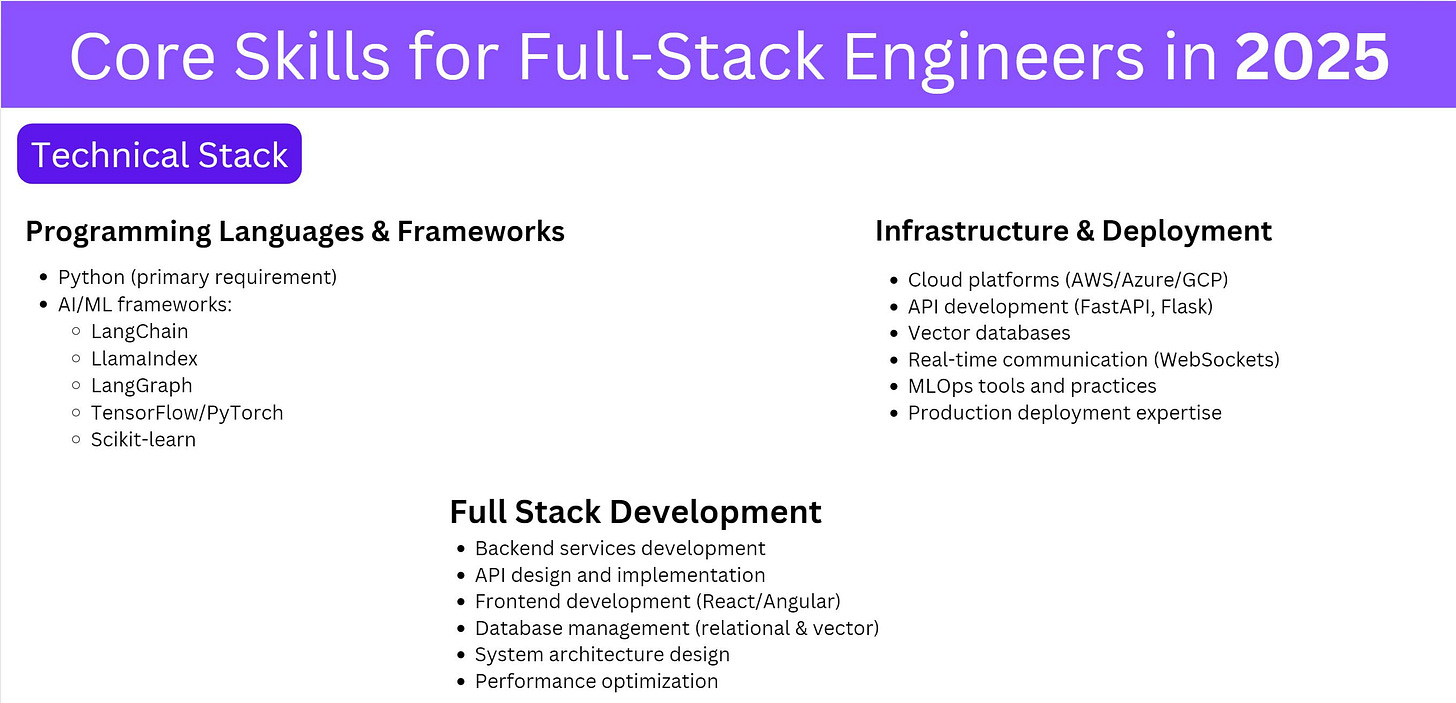Master These Skills to Dominate 2025
Today I want to share something I deeply believe will shape the future of software engineering.
As we approach 2025, there are rapid advancements in technology that we, as engineers, cannot afford to ignore. Whether you’re looking to add value to your organization, grow your skillset, or simply future-proof your career, there are certain core skills that will set you apart.
Let’s dive right in.
Video
The New Baseline: AI and Business Context Understanding
Gone are the days when being a full-stack engineer meant just knowing how to develop and deploy applications. Today, understanding the "why" behind what you’re building is just as important as the "how."
If you find yourself working on user stories without knowing the business context or understanding the decisions made by your engineering or product managers, it’s time to rethink your approach.
Business understanding is what differentiates an average engineer from a great one.
And as AI continues to integrate into every facet of technology, this understanding will become even more critical.
Here’s my take on the essential skills every full-stack engineer should master to thrive in this new era.
1. Core AI/ML Engineering Skills
Large Language Models (LLMs)
By now, you’ve probably experimented with tools like ChatGPT or integrated APIs into your projects. But to truly excel, you need to:
Understand how LLMs work at a deeper level.
Learn about fine-tuning models for specific use cases.
Master prompt engineering – arranging instructions in ways that yield the best results.
Retrieval-Augmented Generation (RAG)
RAG will remain indispensable for enterprise applications, even as LLMs handle increasingly large context windows. Why? Because RAG ensures that only the most relevant data is fed into the model, optimizing performance and cost. Gaining expertise in designing RAG pipelines and integrating them with business workflows is a must.
AI Agents
The buzzword for 2025 is "agents." Multi-agent frameworks and systems are set to revolutionize how we build solutions. Understanding how to design and orchestrate these systems will keep you ahead of the curve.
2. Technical Stack Mastery
Python: The Go-To Language
Python’s ecosystem for AI and ML is unparalleled. From frameworks like PyTorch and scikit-learn to tools like LangChain and LlamaIndex, Python should be in every engineer’s toolkit. If you’re new to the space, start experimenting with these frameworks.
Cloud Platforms and Vector Databases
Familiarize yourself with cloud platforms like AWS, Azure, or GCP, and tools like VMware Tanzu.
Learn about vector databases, such as PGVector, which allow efficient storage and retrieval of embeddings. Even spinning up a simple Docker instance can give you hands-on experience.
API Development
Frameworks like FastAPI and Flask make it easier to create and deploy AI-powered web applications. Combine this with an understanding of socket programming for real-time communication tools like chatbots, and you’ll be unstoppable.
3. Project and Professional Skills
Business Context Awareness
This is the game-changer. Knowing how your application aligns with business goals will not only make you a better engineer but also ensure your contributions are recognized. Always ask:
Why is this feature important?
How will this decision impact the user or business?
Experimentation Over Perfection
Start small. Use APIs to create prototypes and simulate workflows. For instance:
Identify areas in your organization where generative AI can add value.
Build mock solutions with sample data to prove concepts.
MLOps and Deployment
Understanding MLOps tools and practices is becoming essential for deploying AI solutions. Even if you’re not directly managing infrastructure, knowing how to streamline deployment pipelines will make you invaluable to your team.
My Journey: From Experimentation to Mastery
When I transitioned into AI engineering in early 2023, I didn’t start by mastering machine learning fundamentals. Instead, I began tinkering with LLM APIs and building prototypes. This hands-on experimentation allowed me to solve real-world problems while gradually deepening my knowledge of ML fundamentals over the next six months.
This approach worked wonders for me, and I recommend it to anyone looking to enter the field. Don’t get bogged down by theory. Instead, balance learning with application. Keep a 60/40 or even 50/50 ratio between theory and practice to maximize your growth.
Final Thoughts
The expectations for full-stack engineers are evolving, and AI skills are no longer optional.
By mastering core AI/ML engineering concepts, staying updated with the latest frameworks, and understanding business context, you’ll position yourself as a leader in your field.
So, what’s your game plan for 2025? Let me know in the comments below. And if you’re ready to start tinkering, I’ve got tons of tutorials on my channel to help you get started. Until next time, happy coding!




